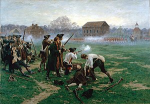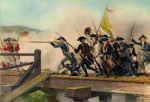Henry Bowman
Veteran Member

General Thomas Gage, an amiable English gentleman with an American-born wife, commanded the garrison at Boston, where political activity had almost wholly replaced trade. Gage's main duty in the colonies had been to enforce the Coercive Acts. When news reached him that the Massachusetts colonists were collecting powder and military stores at the town of Concord, 32 kilometers away, Gage sent a strong detail from the garrison to confiscate these munitions. After a night of marching, the British troops reached the village of Lexington on April 19, 1775, and saw a grim band of 70 Minutemen -- so named because they were said to be ready to fight in a minute -- through the early morning mist. The Minutemen intended only a silent protest, but Major John Pitcairn, the leader of the British troops, yelled, "Disperse, you damned rebels! You dogs, run!" The leader of the Minutemen, Captain John Parker, told his troops not to fire unless fired at first. The Americans were withdrawing when someone fired a shot, which led the British troops to fire at the Minutemen. The British then charged with bayonets, leaving eight dead and 10 wounded. It was, in the often quoted phrase of Ralph Waldo Emerson, "the shot heard 'round the world." By the rude bridge that arched the flood, Their flag to April's breeze unfurled, Here once the embattled farmers stood, And fired the shot heard round the world. The foe long since in silence slept; Alike the conqueror silent sleeps; And Time the ruined bridge has swept Down the dark stream which seaward creeps. On this green bank, by this soft stream, We set to-day a votive stone; That memory may their deed redeem, When, like our sires, our sons are gone. Spirit, that made those heroes dare To die, and leave their children free, Bid Time and Nature gently spare The shaft we raise to them and thee. Ralph Waldo Emerson Then the British pushed on to Concord. The Americans had taken away most of the munitions, but the British destroyed whatever was left. In the meantime, American forces in the countryside mobilized, moved toward Concord and inflicted casualties on the British, who began the long return to Boston. All along the road, however, behind stone walls, hillocks and houses, militiamen from "every Middlesex village and farm" made targets of the bright red coats of the British soldiers. By the time the weary soldiers stumbled into Boston, they suffered more than 250 killed and wounded. The Americans lost 93 men. |


Concord Bridge
